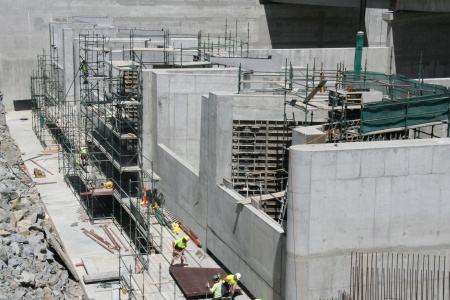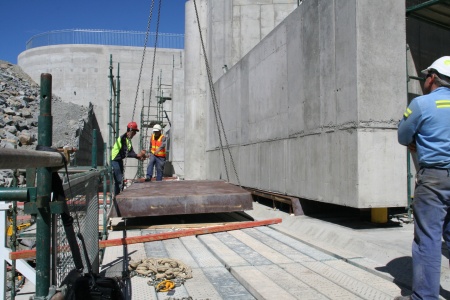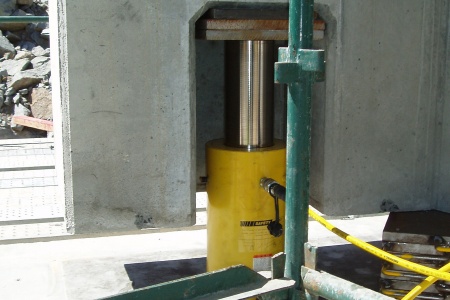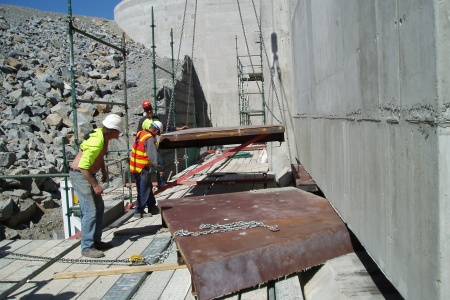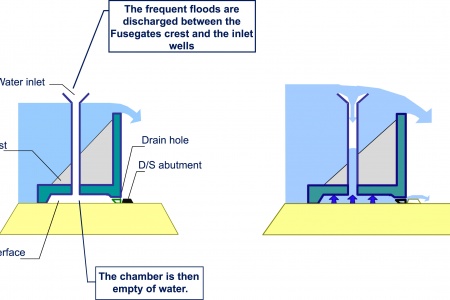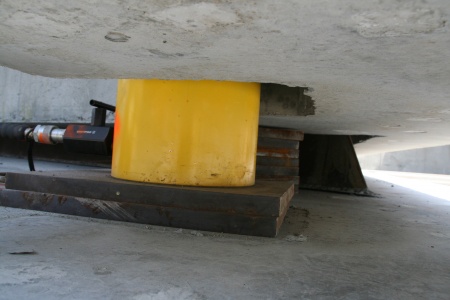Lifting system helps to install a flood control system
Customer:Hydroplus Australia
Location:Jindabyne Dam, Australia
An Enerpac power lifting system configured for precision and safety has been employed to help install a flood control system on a key dam of the world famous Snowy Mountains hydroelectric Scheme.
The simply operated hydraulic system was specified for use during the installation of eight 300-ton plus Hydroplus Fuse gates in a new auxiliary spillway to protect the Jindabyne Dam in the high country of Australia.
The 335 m long and 71 metre high rockfill embankment dam carries the Monaro Highway serving townships and major ski resorts. It is one of sixteen dams of the Snowy Scheme, which was completed in 1967 to store water for irrigation and hydro power generation. The Scheme diverted major river flows westwards from Australia’s highest alpine region, using water previously flowing east to open up major industries extending across three States.
Undertaken by Snowy Hydro Limited to maintain their exemplary dam safety record, the flood protection measures are designed to safeguard people and property even against extreme floods.
The new Jindabyne Dam Fuse gates, where the 700 bar high pressure Enerpac lifting system was employed, comprise Hydroplus’ patented spillway control system of a type used in 41 dams worldwide.
The Jindabyne units each contain 9m to 11m high inlet well shaftshuge mining dragline weighing more than 3500 tons or “chimneys” down which water passes to tip the Fusegates over during extreme floods.
Hydroplus Australia Director, Bill Hakin says an outstanding feature of the Fuse gates is that they overturn automatically in a pre-determined sequence to progressively release water according to pre-set upstream flood water levels. They are not activated by smaller to moderate floods, which spill over the crest of the Fuse gates.
“From an engineering viewpoint , a wonderful feature is that their operation is non-mechanical; virtually maintenance free; very safe and reliable. As rising flood water spills over the Fuse gates it ultimately - at a pre-determined level - begins to enter the chimneys which are set at increasing heights above the crests of the Fuse gates and which extend down to a chamber at the base of each unit.
“Water pressure gradually builds up in the chamber until it reaches the point where it tips the entire structure, which releases more water downstream and takes pressure off the dam. The Fuse gates tip one at a time, in a sequence from one through to eight, to cope with the degree of water release required.”
The Enerpac equipment involved in the project included CLRG 20012 High Tonnage jacks, which each offer up to 200 tons of force and 300mm of stroke from a highly reliable cylinder that can withstand sideload forces up to 10 per cent of rated capacity without scoring. The double-acting cylinders were used in sets of four to ensure high margins of safety and control in lifting each Fusegate in steps. The system also employed a new generation ZE 700 bar electric pump engineered with fewer moving parts and less friction to run cooler than conventional pumps and require 18 per cent less current draw.
This was coupled to a 40-litre manifold with V82 manual control valves to provide secure load holding as shims were inserted beneath the load and cylinders at each stage of the lift. The system was employed to:
• jack the eight Fuse gates 325 mm (in two stages) to remove prefabricated steel forms used to form the base chamber cavities
• check that no bond was formed during the casting of the Fuse gate between the base chamber beams and the sill
• weigh and check the centre of gravity of the Fuse gates so that design assumptions can be verified and the correct amount of concrete ballast used.
The 300mm high Fusegate base chamber - constructed from steel formwork in four sections - had to be removed from each Fuse gate after concrete was poured. Each Fuse gate was therefore designed with four jacking points to permit lifting and removal of steel formwork.
“The structural design of the Fuse gates was undertaken by Sinclair Knight Merz consulting engineers under subcontract to Hydroplus Australia and the four jacking recesses were designed with the type of jacks and their load capacity in mind. The jacking system was designed for the worst loading case, where the heaviest completed Fusegate was only supported by three jacks, two upstream and one downstream,” said Bill Hakin.
“Given the awkward shape of each Fusegate and load distribution, an added precaution was to use steel shims placed between the Fuse gate and the sill during the lifting process.
“The lift was done in two stages because of the 325mm lift required with the 300mm maximum stroke available.
“Jacking was undertaken in a slow, controlled manner with shims added adjacent to each jack every 25mm of jack travel to limit any movement in the highly unlikely event of jack malfunction and as a gauge for maintaining horizontality.
“The whole jacking and lowering sequence was specified to take no more than five hours – and we had a fantastic run with it, no problems at all. The whole system was simple and very cost effective, which was important in a project with high safety requirements and a tight budget.
“Despite some initial apprehensions about using a system we personally were unfamiliar with, we were well supported by Enerpac who sent in technical staff to show us the best way to get the safety and precision we needed. The system was very easy to understand and operate safely.”
Enerpac’s lifting systems have already demonstrated their prodigious lifting ability on tasks where safety and precision were at a premium, including use of PLC-controlled Synchronous Lifting Systems in splitting of a 3,500-tonne dragline at Curragh in Queensland for maintenance and lifting of bridges for repair. Enerpac systems have also been used in the construction of the world’s highest bridge, the 343 metre high Millau Viaduct in France (which is twice as high as the Sydney Harbour Bridge), and the construction of North Sea oil rigs.

